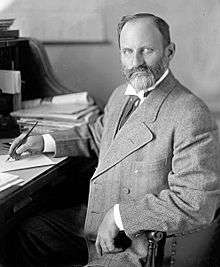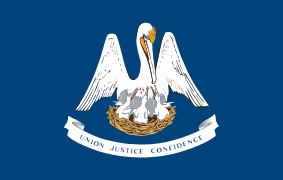Joseph E. Ransdell
| Joseph Eugene Ransdell | |
|---|---|
 | |
| United States Senator from Louisiana | |
|
In office March 4, 1913 – March 4, 1931 | |
| Preceded by | Murphy J. Foster |
| Succeeded by | Huey Pierce Long, Jr. |
| Member of the United States House of Representatives from Louisiana's 5th congressional district | |
|
In office August 29, 1899 – March 3, 1913 | |
| Preceded by | Samuel Thomas Baird |
| Succeeded by | James Walter Elder |
| Personal details | |
| Born |
October 7, 1858 Alexandria, Rapides Parish Louisiana |
| Died |
July 27, 1954 (aged 95) Lake Providence East Carroll Parish Louisiana |
| Resting place | Lake Providence Cemetery |
| Political party | Democratic |
| Spouse(s) | Olive Irene Powell Ransdell (married 1885-1935, her death) |
| Relations |
Brother, Francis Xavier Ransdell |
| Occupation | Attorney; farmer |
| Religion | Roman Catholic |
Joseph Eugene Ransdell (October 7, 1858 – July 27, 1954) was a seven-term United States representative from Louisiana's 5th congressional district who subsequently served for three terms in the United States Senate from Louisiana.
Background
Born in Alexandria in Rapides Parish in central Louisiana, Ransdell attended public schools. In 1882, he graduated from Union College in Schnectady, New York. He studied law, was admitted to the bar in 1883 and practiced from 1883 to 1889 in Lake Providence in East Carroll Parish in far northeastern Louisiana. Ransdell's law partner during the 1880s was his younger brother, Francis Xavier Ransdell, judge of the Louisiana 6th Judicial District Court. Joseph Ransdell was district attorney for the 8th Judicial District of Louisiana from 1884 to 1896. He was a planter of cotton and pecan groves. From 1896 to 1899, he served on the Fifth Levee District Board. In 1898, he was a member of the state constitutional convention.
House and Senate
In 1899, Ransdell was elected as a Democrat to the Fifty-sixth Congress to fill the vacancy created by the death of Samuel Thomas Baird. He won his first full term in Congress in 1900, having defeated the Republican businessman Henry E. Hardtner of Urania in La Salle Parish, 6,172 votes (90.8 percent) to 628 (9.2 percent). Hardtner was the last Republican to contest the seat until 1976, when Frank Spooner of Monroe waged a strong but losing challenge to the Democrat Jerry Huckaby of Ringgold in Bienville Parish. By 1910, Hardtner had switched to Democratic affiliation and served for two years in the Louisiana House of Representatives as the first member ever from La Salle Parish. From 1924 to 1928, Hardtner was a state senator.
Ransdell served in the House from August 29, 1899, to March 4, 1913. He was not a candidate for renomination in 1912, having instead been elected by the Louisiana State Legislature to the United States Senate, prior to the passage of the Seventeenth Amendment to the United States Constitution. In 1918, he defeated future U.S. Senator John H. Overton of Alexandria in a disputed vote. Ransdell won his third term in the Democratic primary election in 1924, having defeated Lee Emmett Thomas, the mayor of Shreveport, 104,312 (54.9 percent) to 85,547 (45.1 percent).
He served from March 4, 1913, to March 4, 1931, but he was denied renomination in 1930 by then Governor Huey Pierce Long, Jr. Long received 149,640 votes (57.3 percent) to Ransdell's 111,451 (42.7 percent). Long was then elected without Republican opposition in the general election. Ransdell may have sown the seeds of his own defeat. He had appeared in 1927 at a Long political rally in Lake Providence, where Judge Francis Ransdell introduced Long, and District Attorney Jefferson B. Snyder, another long-term advocate of the planter interests, sat on the stage. Snyder had not really favored Long so much as he was convinced that Long would defeat his chief opponent, U.S. Representative Riley J. Wilson, the favorite of most planter interests, and Snyder wanted to influence the new governor. At the rally, Huey Long began "a harangue that castigated their closest friends and political allies and the old establishment itself, of which these men were a part."[1] Particularly outraged at Long's treatment of the Randsdells was state Senator Norris C. Williamson of East Carroll Parish, who would not seek compromise with the Longs and retired to private life in 1932, rather than face likely defeat himself.[2]
While in Congress, Ransdell was chairman of the Committee on Public Health and National Quarantine (Sixty-third through Sixty-fifth Congresses) and a member of the Committee on Mississippi River and Its Tributaries (Sixty-sixth Congress). It was in this capacity that Randsell sponsored the Ransdell Act, which created the National Institutes of Health.
Later years
In 1920, Ransdell founded a printing firm in Washington, D.C., at a time when members of Congress could run businesses while serving in office. When his Senate tenure ended in 1931, Ransdell returned to Lake Providence to engage in the real estate business, cotton planting, and pecan growing. He was a member of the board of supervisors of Louisiana State University at Baton Rouge from 1940 to 1944 during the administration of Governor Sam Houston Jones. Ransdell died in Lake Providence and is interred there at Lake Providence Cemetery.
Ransdell was a great-uncle of Frank Voelker, Jr., a Lake Providence attorney who chaired the former Louisiana Sovereignty Commission during the administration of Governor Jimmie Davis and then ran unsuccessful for governor in the 1963 Democratic gubernatorial primary. Frank Voelker, Sr., judge of the Sixth Judicial District from 1937 until his death in 1963, was married to Ransdell's niece, Isabel, and was hence a son-in-law of Judge Francis Ransdell.[3]
Ransdell's great-great nephew was the New Orleans entrepreneur and philanthropist David Ransdell Voelker. Following Hurricane Katrina, Democratic Governor Kathleen Babineaux Blanco named David Voelker to the Louisiana Recovery Authority. Blanco's successor and past opponent, Republican Bobby Jindal, elevated Voelker as chairman of the authority.[4] In 2008, though he had been identified previously as a "longtime, diehard Republican", David Voelker was the largest donor in Louisiana to Democrat Barack H. Obama of Illinois, having given the then neophyte presidential candidate $80,000, according to the nonpartisan Center for Responsive Politics in Washington, D.C.[5]
Ransdell named the community of Elmwood southwest of Lake Providence, where he owned much of the land, for his boyhood plantation in Rapides parish. In 1976, more than thirty years after Ransdell's death, St. Patrick's Roman Catholic Church in Lake Providence moved into a new building on a lot which the former senator had willed to the congregation. The new location at 207 Scarborough Street, is directly across the street from the earlier structure where Ransdell and his family had long worshiped.[3]
The definitive biography of Ransdell was written in 1951 by Adras LaBorde, long-time managing editor of the Alexandria Daily Town Talk.
See also
References
- ↑ James Matthew Reonas, Once Proud Princes: Planters and Plantation Culture in Louisiana's Northeast Delta, From the First World War Through the Great Depression, p. 195, 197 (PDF). Baton Rouge: Louisiana State University Ph.D. dissertation, December 2006. Retrieved July 19, 2013.
- ↑ Once Proud Princes, pp. 197-198
- 1 2 "East Carroll Parish, Louisiana, Genealogy, August 24, 2010". eastcarrollparishlouisianagenealogy.blogspot.com. Retrieved May 31, 2013.
- ↑ "David Voelker, 'one of the great saints of the recovery,' dies at 60". New Orleans Times-Picayune. Retrieved June 2, 2013.
- ↑ "Story Archives: Obama's Louisiana Donors' Reasons Varied". lanewslink.com. Retrieved June 2, 2013.
External links
- United States Congress. "Joseph E. Ransdell (id: R000059)". Biographical Directory of the United States Congress.
- Joseph E. Ransdell at Find a Grave
- Cemetery Memorial by La-Cemeteries
| United States House of Representatives | ||
|---|---|---|
| Preceded by Samuel Thomas Baird |
Member of the U.S. House of Representatives from Louisiana's 5th congressional district August 29, 1899 – March 4, 1913 |
Succeeded by James Walter Elder |
| United States Senate | ||
| Preceded by Murphy J. Foster, Sr. |
U.S. Senator (Class 2) from Louisiana March 4, 1913 – March 4, 1931 Served alongside: John Thornton, Robert F. Broussard, Walter Guion, Edward Gay, Edwin Broussard |
Succeeded by Huey Long |
| Honorary titles | ||
| Preceded by Robert Owen |
Oldest living U.S. Senator July 19, 1947 – July 27, 1954 |
Succeeded by Lawrence Phipps |


